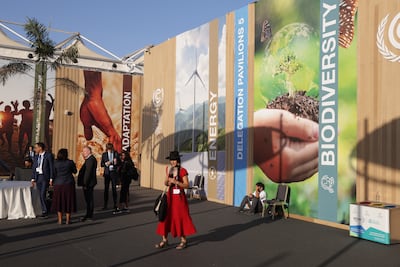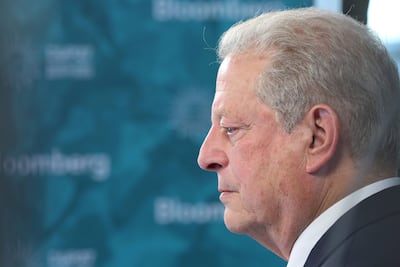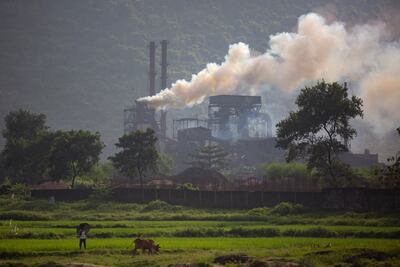Follow the latest news on Cop27 in Egypt
The UN climate conference’s “finance day” on Wednesday yielded a windfall of billions of dollars’ worth of pledges and initiatives to fight the climate crisis threatening the future of the planet.
But with the positive announcements and pledges came news that doesn't bode well from India and Al Gore's emissions inventory, on a day when 200 government representatives, NGOs and financial corporations struggled to secure the massive funds needed to fight climate change.
They say current funding is far from sufficient to fight challenges including rising temperatures and sea levels, floods and desertification.
The scale of the crisis has not deterred donors, however. First out of the blocks on Wednesday was the Arab Co-ordination Group, which pledged $24 billion in climate change financing by 2030.

In another positive development, the United States and the European Union said they planned to unveil a joint agreement to accelerate efforts to reduce emissions of the potent greenhouse gas methane from the fossil fuel sector.
Both the US and EU, the biggest greenhouse gas emitters after China, have proposed regulations to curb oil and gas companies' methane leaks domestically, but they have not yet been implemented.
The commitment announced by the ACG on Wednesday will support the acceleration of the energy transition, increase the resilience of food supplies, transport, water and urban systems, and promote energy security, the group said.
The ACG comprises 10 regional and international organisations, including the Abu Dhabi Fund for Development, the Islamic Development Bank and the Opec Fund for International Development.
“The ACG’s sizeable financing represents decisive and collective action to address one of the world’s most urgent challenges,” said Abdulhamid Alkhalifa, the Opec Fund director-general.
Separately, US climate envoy John Kerry announced on Wednesday the creation of a carbon offset plan that would help developing countries speed their transition away from fossil fuels.
The United States will develop the programme with the Bezos Earth Fund and Rockefeller Foundation, with input from the public and private sectors which would operate until 2030 and possibly be extended to 2035.
Mr Kerry said Chile and Nigeria are among the developing countries that have expressed early interest in the carbon offset plan.
Mr Kerry’s announcement came as the world awaited the final outcome of the US midterm elections, with climate campaigners hoping Democrat President Joe Biden’s $370 billion green energy legislation would not be thwarted even if Republicans take one or both houses.
Keeping global temperature rises below 1.5 degrees Celsius is still possible but will require private sector funding, Mr Kerry said on Wednesday.
Speaking at a Bloomberg Green event on the sidelines of the summit, Mr Kerry said that meeting the goal would require a global effort and that this, along with reducing methane emissions, were key areas of cooperation with China.
Meanwhile, a growing number of countries, including China, said they were prepared to compensate developing countries that had suffered the worst impact of climate change.
Austria has offered $50 million and Belgium says it will give $2.5 million to Mozambique, adding to $13 million that Denmark has earmarked for loss and damage in North Africa and the Sahel.
Scotland, which kicked off the loss and damage pledges last year when Britain hosted the COP26 summit, has also upped its contribution to $8 million.
Meanwhile, Germany is touting its “global shield” project, due to be officially launched in Egypt next week, as a way to provide climate risk insurance and prevention to vulnerable countries.
It announced $170 million for the project this week, while Ireland said it would contribute $10 million for 2023.
The cautiously upbeat mood in Sharm El Sheikh, the Egyptian Red Sea resort where the UN summit is being held, was dampened by an announcement of a detailed inventory of the top known sources of greenhouse gas emissions. The report found that the world’s top 14 individual polluters are all gas and oil fields and their associated facilities.

Launched by former US Vice President and veteran climate change campaigner Al Gore, the inventory found that emissions stemming from oil and gas production were already estimated to be about double what was reported to the UN last year.
The inventory was compiled by Climate TRACE, a coalition of researchers, data analysts and non-governmental organisations who use multiple open sources including satellite coverage, remote sensing and artificial intelligence to track who exactly is polluting, and how much.
Another piece of bad news came from India, one of the world’s top emitters, where a senior official said coal will play an important role in his country until at least 2040.

Addressing a parliamentary committee, the minister in charge of coal, Pralhad Joshi, said coal was an affordable source of energy and demand for it had yet to peak.
“Thus, no transition away from coal is happening in the foreseeable future in India,” Mr Joshi said. It would have a big role in India until 2040 and beyond, he said.
UN Secretary-General Antonio Guterres has called for urgent action to cut emissions, including phasing out coal by 2040.














































